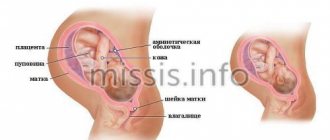Difficulty defecating is a very common problem during pregnancy. Constipation in pregnant women occurs due to various factors. These include hormonal changes, a growing uterus, and an increase in the sensitivity threshold of intestinal receptors. Changes in the body weaken intestinal function and slow down the digestion process.
Constipation during pregnancy is not just a delicate problem. It can affect the well-being of the expectant mother and the health of the baby. Retention of stool leads to pain in the lower abdomen, which can be confusing, as they are easily confused with unpleasant sensations due to hypertonicity of the uterus. Chronic constipation often leads to changes in the psycho-emotional state and makes a woman irritable. It causes increased fatigue, which is already common to many women who are awaiting replenishment.
To get rid of discomfort and avoid complications, you need to carefully consider this problem and start treatment on time.
Types of constipation during pregnancy
There are 2 main types of constipation: mechanical and nutritional. The mechanical type is associated with difficulty in moving feces through the intestines, that is, its peristaltic function is disrupted. The occurrence of this type of constipation may be associated both with the presence of diseases in the body (kidney failure, hemorrhoids, diabetes mellitus, etc.) and with the use of certain medications. Nutritional problems arise due to changes in eating habits. They can be promoted by: · Eating insufficient amounts of fiber, which leads to a decrease in intestinal motility. · Reducing the amount of food, diet. · Dehydration due to insufficient fluid intake or excess fluid excretion from the body. The main causes of constipation during pregnancy
The period of bearing a child is accompanied by a large number of changes in the body of the expectant mother. That is why the appearance of constipation is often a consequence of an increase in the level of progesterone in a woman’s body.
Due to the increased content of the hormone in the blood, the intestinal muscles relax, which slows down the movement of the food bolus through the digestive tract. An additional physiological factor that contributes to the emergence of a delicate problem is an increase in the size of the uterus. Due to this, pressure on the intestines increases, which leads to difficulty in defecation.
Also, during pregnancy, many women encounter such an unpleasant condition as anemia. For iron deficiency anemia, women are prescribed iron supplements, which have constipation among their side effects.
Causes of occurrence in early pregnancy The main cause of constipation in early pregnancy is a change in hormonal levels in a woman’s body. However, the following can also contribute to this condition: · Early toxicosis, which is accompanied by vomiting. As a result of this, the woman loses a large amount of fluid, which leads to dehydration and hardening of the stool (which is a common symptom of constipation) · Taking iron and calcium supplements. Problem with bowel movements is one of the side effects of these drugs. · Bed rest. If a woman is found to be at risk of miscarriage, she is advised to reduce her level of physical activity. And, as you know, a sedentary lifestyle can cause constipation.
Diagnosis of constipation
Diagnosis is based on complaints that a woman voices to the doctor. As a result, a diagnosis of chronic constipation may be made. However, identifying the causes is important here, since stool retention is only a symptom. It is important to establish the development mechanism to eliminate the causes.
What to do about constipation during pregnancy? First of all, tell the gynecologist who is treating you about this. If necessary, he will refer you to specialized specialists if there is reason to suspect diseases of the gastrointestinal tract or other pathologies. It is important to tell about how long ago the retention of stool began, and whether the problem was observed before conception.
Complex diagnostics usually includes laboratory and instrumental methods, taking into account the duration of pregnancy and the individual characteristics of its course.
The doctor excludes serious pathologies based on the results of routine examinations: assessment of the level of glucose in the blood and thyroid hormones, conclusions of a therapist, etc. In addition, at certain times, the patient undergoes routine examinations by specialized specialists. If she does not have chronic diseases that can lead to constipation, the doctor will explain the reasons for the difficulty in defecation and talk about how to deal with it.
Causes of occurrence in the second and third trimester of pregnancy
If in the early stages of pregnancy many women feel great, then the closer the date of birth gets, the greater the risk of encountering constipation. This is due to a number of reasons: · The weight of the fetus increases, due to which the pressure on neighboring organs increases. Including on the intestines, which will make emptying it difficult. · After 35 weeks it becomes difficult to lead an active lifestyle. A woman’s motor activity decreases, which contributes to a decrease in intestinal motility. · Limit the amount of fluid consumed. In the later stages of pregnancy, many women experience such an unpleasant phenomenon as edema. And to avoid them, reduce the amount of water consumed. This directly affects the feces - they become hard and dry, and the act of defecation becomes difficult and accompanied by discomfort. · Lack of fiber in food, which is associated with changes in eating habits. At the same time, intestinal motility decreases. · Emotional stress. Fear, awareness of oneself in a new social role, responsibility for the baby’s health - all this affects the nervous system of the expectant mother. Constipation may also occur as a result of emotional discomfort. · Exacerbation of chronic diseases. During pregnancy, all the resources of the expectant mother’s body are aimed at maintaining the pregnancy and bearing the baby. But against the backdrop of a lack of macro- and microelements in the female body, as well as restrictions on taking certain groups of medications, activation of chronic processes is possible.
The main signs of constipation during pregnancy Rare stools are just one of the signs of constipation; in fact, there are many more of them. But it is worth knowing which symptoms indicate the presence of constipation in order to consult a doctor in time: · the absence of bowel movements for two days already indicates constipation; · pain, tightness of the abdomen; · feces are dry, hard; · burning in the rectum; · feeling of incomplete bowel movement; · bloating, flatulence; · irritation in the anus; · appearance of blood in stool; · reduction in the amount of excreted feces; · nausea accompanied by bitterness in the mouth.
Features of treatment and laxatives
Treatment of constipation during pregnancy requires an integrated approach. The doctor’s first recommendation will be to adjust your lifestyle and diet. In case of ineffectiveness or poor effectiveness of such measures, symptomatic therapy is prescribed. The doctor will not wait for results from the diet if constipation causes severe discomfort, there is a risk of complications, and urgent help is required.
When choosing a laxative, it is important to pay attention to the safety of the drug for both the expectant mother and the baby. There are several groups of laxatives:
- Osmotic (macrogol, lactulose). Products based on macrogol (polyethylene glycol) help soften stool and increase its volume. As a result, the walls of the colon are stretched, which stimulates their contraction and bowel movements. Lactulose preparations are laxatives with prebiotic action. They also increase the volume of intestinal contents, increase osmotic pressure, dilute stool and stimulate peristalsis. In addition, lactulose stimulates the growth of lactobacilli and inhibits the growth of ammoniogenic microorganisms and salmonella.
- Softening. Such products are represented by oils and glycerin, they promote the penetration of water into the stool. These drugs can only be recommended for the treatment of occasional constipation, since vegetable oils interfere with the absorption of fat-soluble vitamins (A, ED, K). They are prescribed to pregnant women with great caution to avoid complications such as hypovitaminosis.
- Bulk laxatives: vegetable - bran, plantain seeds, flax, etc.; synthetic - preparations based on cellulose. Promotes fluid retention in the intestines, increases the volume of feces, and gently stimulates peristalsis. Suitable for continuous use for constipation with normal transit time.
- Anthraquinone derivatives, stimulant laxatives. Preparations based on buckthorn, rhubarb, and senna are absolutely contraindicated during pregnancy. They have a teratogenic effect and can cause severe pathologies in fetal development. In addition, such laxatives are addictive and are fraught with irreversible consequences for a woman’s digestive system.
The doctor may prescribe other groups of drugs to relieve constipation. If means for regulating intestinal motility are in most cases contraindicated for the expectant mother, then pre- and probiotics can be recommended to restore the intestinal microflora. This is especially true in cases where stool retention has been observed for a long time and there is a possibility of an imbalance in the microflora.
The range of medications approved for use in pregnant women is very limited.
For expectant mothers, medications that irritate the intestinal epithelium, increase peristalsis and have a softening effect are contraindicated. During this period, doctors recommend using laxatives that do not harm the health of the mother and fetus and do not affect the course of pregnancy. For example, agents of the osmotic, isoosmotic group. These drugs do not penetrate the fetoplacental barrier, are not absorbed into the gastrointestinal tract, and do not change the tone of the inner layer of the uterus (myometrium).
Such products include “Fitomucil Norm”. The drug does not contain senna or components with teratogenic effects. The product contains natural sources of soluble fiber: the shell of plantain seeds, as well as the pulp of homemade plum fruits. “Fitomucil Norm” gently restores the rhythm of the intestines, normalizes stool, and facilitates the process of defecation. In addition, “Fitomucil Norm” is an English drug with guaranteed quality of raw materials, high efficiency and safety.
Prebiotics and probiotics provide indirect help for constipation. They help normalize the ratio of bacteria, promote the production of vitamins, normal and regular bowel function. Probiotics provide a favorable environment for the proliferation of your own beneficial flora. Prebiotics, in turn, are a complex of living bifidobacteria and lactobacilli that populate the intestines and help eliminate the manifestations of dysbiosis. Such drugs are approved for use in pregnant women according to indications.
Decoctions of prunes or rolled oats, as well as a mixture of dried apricots, raisins and honey, are good for constipation. Dried apricots contain a lot of fiber and are a kind of natural bulk laxative. Regular consumption of kiwi also helps normalize stool in pregnant women. Fresh vegetables and fruits containing large amounts of dietary fiber have a similar effect. But it is important to remember that not all common products and folk remedies can be used during pregnancy.
At the first symptoms of constipation, it is advisable to inform your doctor about this and discuss with him the optimal way to combat constipation.
How to get rid of constipation during pregnancy
The process of fetal development is a delicate period in the life of every woman; it is worthwhile to approach the treatment of constipation at this time with special care. Most drugs can penetrate the placental barrier and affect the baby’s body, so you should not self-medicate. It is better to entrust your health and the health of your baby to your doctor. As a rule, pregnant women rarely resort to the use of medications. First of all, diet, water balance and physical activity are adjusted. If a set of these measures does not give the desired result, then medications are used.
Laxatives
All medications that a doctor prescribes for a pregnant woman have certain instructions in the instructions. Medicines undergo a series of tests, based on which researchers conclude whether they penetrate the fetoplacental barrier and what effect they have on fetal development and maternal health.
The FDA, or Food and Drug Administration, has several safety categories for drugs during pregnancy:
- A: long-term studies of the drug’s effect on the body of pregnant women have revealed no risk to the fetus in the 1st trimester; there is no evidence of risk in later stages.
- B: no established risk to the fetus in the 1st trimester, no evidence of risk later.
- C: The benefits of the drug may outweigh the risks/there are no clinical studies in humans.
- D: There is evidence of risk to the fetus, but the potential benefit outweighs the possible risk.
- X: studies have identified fetal abnormalities/adverse reactions that pose a risk that outweighs the potential benefit.
However, the instructions for not every laxative drug contain instructions for permission or prohibition of use in pregnant women. For example, researcher Sokolova (Sokolova M. Yu., 2013, p. 29).
It is known that the list of laxatives approved for use in pregnant women is quite small. Irritating laxatives often lead to prolonged diarrhea and electrolyte disturbances, and also have a mutagenic effect.
Increased intestinal motility from stimulant drugs also stimulates uterine contractions. Their long-term use provokes degenerative changes in the intestinal nervous system. These drugs are genotoxic and mutagenic.
Osmotic laxatives may be recommended for constipation during pregnancy. But it is important to take into account the peculiarities of using such drugs: they require drinking a large amount of liquid. This can cause a shift in water balance and the development of edema. If you do not consume more than 1.5 liters of fluid per day, there is a possibility of developing disorders.
That is why a laxative must meet three important conditions:
- safety for the fetus;
- safety for women's health;
- safety for the course of pregnancy itself.
There is a category of women who enter pregnancy with a history of constipation. Among them there are also those who already use certain medications to solve their problem. During pregnancy, it is important to adjust the approach to getting rid of defecation retention. You should tell your doctor what medications you have been taking and for how long. Self-medication in this case is unacceptable, since it is often necessary to abandon habitual laxatives in order to avoid complications.
The role of nutrition in the prevention of constipation during pregnancy
It is generally accepted that during pregnancy a woman should eat for two. On the one hand, this is true - nutrients from the mother’s body enter the baby’s body and give him the opportunity for normal growth and development. On the other hand, some pregnant women take this statement too literally: they do not control their appetite and blindly follow their new food preferences. And in such cases, food becomes not a source of vital energy, but a cause of constant discomfort. Reducing the amount of water and fiber leads to constipation, and excess salt leads to edema.
While carrying a child, many women gain a lot of weight, and after giving birth they cannot lose weight precisely because of the mindset that they need to eat for two.
Second trimester
These symptoms may become more severe in the second half of pregnancy. The already enlarged fetus begins to put pressure on the intestines, which can make it difficult to function. The nervous system suppresses all contractions not only in the uterus, but also in the intestines, since active contractions of the intestines can lead to contractions of the uterus. Hormonal levels also change. The increased level of the hormone progesterone not only relaxes the muscle cells of the uterus to prevent contractions, but also entails a decrease in natural intestinal motility5. These changes can cause constipation to develop in the second trimester of pregnancy.
Normal weight gain during pregnancy
On average, during 40 weeks of pregnancy, weight gain is 10-14 kilograms. A more accurate figure is calculated by the obstetrician-gynecologist with whom the woman is registered.
In the first and second trimester, a woman on average gains 250-300 grams of weight per week. In the third, the rate of weight gain increases to 400 grams, as toxicosis recedes and the fetus increases significantly in weight. An increase in body weight above these figures during gestation is associated with incorrect eating habits and the attitude that you need to eat for two. Excessive weight gain can have a negative impact on the body of the expectant mother and baby, so you should carefully monitor your diet and engage in moderate physical activity.
How to deal with constipation...
One of the main dangers of constipation during pregnancy is that traditional remedies for constipation often pose a threat to women expecting a child. Enemas and many laxatives are prohibited for them during this period.
Only a doctor can choose a safe drug, so you should not self-medicate. However, you should start the fight against constipation with non-drug methods and only if they are ineffective, start choosing a pharmacological remedy.
Dietary rules for a pregnant woman with constipation
First of all, you need to formulate the right nutrition system after consulting with your doctor. You should exclude fried foods from your diet or sharply limit their consumption. It is worth giving preference to products that were prepared by baking or steaming. The number of meals should be 5-6 times a day. Small portions will prevent you from overeating, and frequent eating will prevent the feeling of hunger. You should definitely include fresh fruits and vegetables in your daily diet to enrich your body with vitamins and fiber.
You should also pay attention to maintaining water balance. A sufficient supply of fluid to the body allows not only to improve the general condition, but also to get rid of constipation. Foods that should be excluded from a pregnant woman's diet These foods cause bloating and flatulence, which lead to discomfort. It is for this reason that it is recommended to limit their consumption during the period of bearing a child: · legumes (peas, beans, etc.); · cabbage; · juices (apple and grape); · chocolate, candies; · bread made from premium flour; · rich pastries; · meat broths; · fatty meats; · canned foods; · herbs and spices.
List of all approved drugs
Regardless of the trimester, only a few laxatives for pregnant women can be used during pregnancy:
- Duphalac;
- Phytomucil;
- Senade;
- Microlax;
- Glycerin suppositories.
Other medications are selected only by the attending physician, based on the condition of the woman, the fetus, the presence of contraindications and concomitant diseases. Here is the main list of drugs, laxatives:
- Lactovit;
- Lactulose;
- Inulin;
- Dufalak;
- Normaze;
- Forlax;
- Magnesium sulfate;
- Exportal;
- Sodium sulfate;
- Laxomag;
- Carlsbad salt;
- Morshyn salt;
- Kafiol;
- Regulax;
- Picolax;
- Guttalax;
- Bisacodyl;
- Defenorm;
- Norgalax;
- Laminaride;
- Angiopax;
- Fiberlex;
- Transipeg;
- Mucofalk.
Anti-constipation pills allow you to get rid of feces before intoxication begins. There is no need to save money and buy an inexpensive, cheap laxative.
Constipation during pregnancy using osteopathic methods
Another way to get rid of the problem is to see an osteopath. It is absolutely safe for pregnant women, and at the same time helps to get rid of the cause of constipation through manual intervention. Osteopathic methods will be effective in the presence of the following reasons: · Violations of the mechanics of the spinal column due to the heavy load on it during the period of bearing a child. · Excessive tension in the pelvic and lumbar region, due to pressure from the fetus on nearby organs and tissues. · Mechanical stool disorders. Thanks to the gentle effects, osteopathic methods allow you to normalize blood flow and lymph circulation, which allows you to activate the processes of removing food debris from the body.
An osteopath relieves tension and tension, which also has a beneficial effect not only locally, but also on the body as a whole.
At the Quality of Life clinic, appointments are conducted by specialists who, depending on the stage of pregnancy, will suggest a set of exercises. It will increase motor activity, which is necessary to improve the quality of peristalsis, prevent or treat problems with stool. Exercises selected by a qualified exercise therapy specialist are absolutely safe. For each trimester, you can choose the most suitable complex that will help solve the problem.
Use of medications for constipation If all of the above methods do not help get rid of the problem, resort to treatment with medications.
Under no circumstances should you resort to using them on your own; a preliminary consultation with your gynecologist is required.
...with the help of drugs
As mentioned above, most laxatives are dangerous for pregnant women. The fact is that they can increase the tone of the uterus, which will negatively affect the development of the fetus, and in the worst case, can lead to termination of pregnancy.
To avoid this outcome, do not self-medicate. If you are constipated, consult your doctor and follow his recommendations. If changing your diet does not bring the desired effect or turns out to be an insufficient measure, a specialist will prescribe you the safest medications for constipation during pregnancy.
These include:
- Duphalac syrup - it has a delicate effect on the intestines and gently removes feces from the body;
- Microlax is a gentle remedy for constipation with a very quick effect;
- Glycerin suppositories are a safe remedy that does not provoke an increase in uterine tone.
Once again we would like to draw your attention to the fact that even the above medications can only be taken after consultation with your doctor.
The choice of remedy for constipation also depends on the stage of pregnancy. The 1st trimester is the most dangerous period, during which increased uterine tone is often observed. At this time, only the most gentle means can be used.
It is much easier to determine what to do for constipation during pregnancy in the 2nd trimester. During this period, the complex treatment already described is used: a diet in combination with medications chosen by the doctor (if changing the diet is ineffective). In the 3rd trimester, the risk of edema is high, so doctors try not to prescribe medications that retain fluid in the body.










